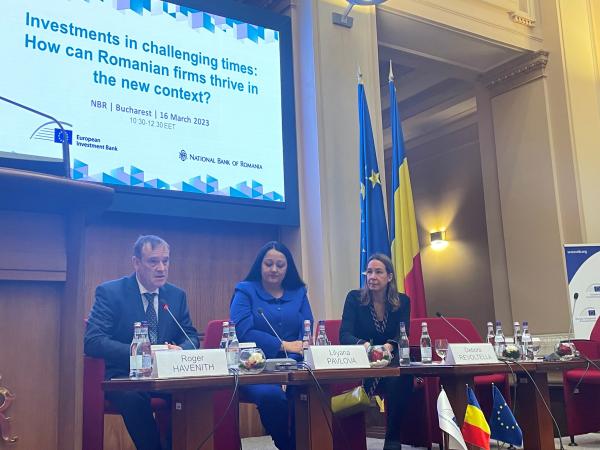
- 69% of Romanian firms surveyed say climate change is having a negative impact.
- Companies’ use of advanced technologies has grown significantly: Beating the EU average, almost three-quarters of Romanian firms are using at least one advanced digital technology.
- Energy costs emerge as a key concern for firms, together with uncertainty and a skills gap.
- Romanian firms recovered after the COVID-19 pandemic, and most (55%) are expected to have sales in 2022 above those in 2019.
The European Investment Bank (EIB) unveiled the results of its annual EIB Investment Survey (EIBIS) in Romania today at an event organised together with the National Bank of Romania. The survey shows that on average, Romanian firms are emerging from the pandemic in a relatively good shape, and have used the crisis as an opportunity to change.
The EIBIS polled over 12 000 companies across the European Union and 800 US firms. Keynote speeches by EIB Vice-President Lilyana Pavlova and Governor of the National Bank of Romania Mugur Isărescu, as well as a presentation by Debora Revoltella, Director of the EIB’s Economics Department, assessed the state of the Romanian economy, companies’ perceived challenges, and opportunities waiting to be seized in the context of the green transition.
Romanian firms became more digital, more often developed new products and shortened their supply chains. The EIBIS results indicate that they now use advanced digital technologies as often as in the United States and the European Union.
Actions taken as a result of COVID-19 (% share of firms)

Source: EIB Investment Survey 2022. Q. As a response to the COVID-19 pandemic, have you taken any actions or made investments to…?
Yet, vulnerability remains in the wake of new shocks. Romanian firms are more likely to suffer from high energy costs and the tightening of financing conditions. On balance, firms had a negative outlook, especially regarding the economic climate. Access to finance is worrisome. The proportion of Romanian firms that said they are facing financing constraints (15.2%) exceeds the EU average (6.2%) and is the highest on record in the EIB Investment Survey series.
“The current economic environment in Romania makes public and private investments in renewable energy extremely cost-effective. Policy support in Europe must ensure that such investments do not take too long to implement, in order to maintain competitiveness in the global market,” said Debora Revoltella, Director of the EIB’s Economics Department. “Using all financing available to Romania, including EU funds from the Recovery and Resilience Facility, InvestEU and 2021-2027 operational programmes, is key. Blending the available EU grant resources with loans, equity, own resources or other forms of financial instruments will be crucial to fostering a greener economy in Romania and to its ability to rely on safe and predictable energy resources. There is also a strong need for firms and public authorities to address the shortage of skills and financing necessary for the green transition.”
Mugur Isărescu, Governor of the National Bank of Romania, remarked: “I commend EIB’s continuous involvement and support in engaging with stakeholders in Romania through these valuable series of events. There is already a tradition, today’s conference being the sixth we have co-organized and hosted. Romania and the European Investment Bank share a long and fruitful partnership that has resulted in projects in important sectors of our economy. I am certain we will be able to continue to build on this important partnership, tackling variable challenges and opportunities. In this current juncture, the balanced macroeconomic policy mix and the implementation of structural reforms, including the use of EU funds to foster the growth potential over the long term, are essential in preserving a stable macroeconomic framework and strengthening the capacity of the Romanian economy to withstand adverse developments.”
Availability of skilled staff
Four out of five Romanian firms surveyed in the EIBIS identified availability of skilled staff as an obstacle to investment. Shortages of skilled staff were an especially prevalent issue for firms in manufacturing (87%) and infrastructure (81%).
Climate change and energy crisis
69% of firms surveyed in Romania reported that weather events negatively impacted their business. Almost half of Romanian firms (49%) have already developed or invested in measures to build resilience to the physical risks caused by climate change. This is substantially higher than the EU average (33%) and in line with the higher perceived losses due to extreme climate events.
The energy crisis magnified concerns about rising energy prices, with 90% of firms citing energy costs as a long-term investment concern. Some 35% of firms in Romania invested to enhance energy efficiency in the last year, close to the EU average of 40%.
About the Economics Department of the EIB
The EIB Economics Department provides economic research and studies, as well as unique analyses of investment activities in the European Union and beyond. It supports the Bank in its operations and in the definition of its positioning, strategy and policy. Chief Economist Debora Revoltella heads the department’s team of 45 economists

©EIB
Download original

©EIB
Download original

©EIB
Download original